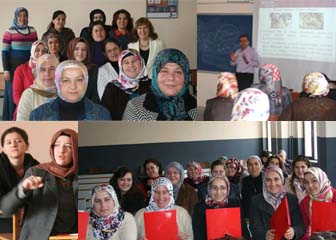Suzanne’s Project Pilot Program in Turkey
Goals
The goal of the Suzanne’s Project Pilot Program was to recognize and develop the technical and managerial capacities of Turkish women farmers through specialized training in business management skills and new production methods, while supporting the region’s socio-economic advancement toward gender equality and sustainable agricultural development.
“I want to cultivate, to not harm human health, to produce natural and fresh products and expect to contribute to the family budget. I plan to use optimal production conditions.” Graduate of the 2011 Suzanne’s Project Pilot Program commented on the effects of the program.
Objectives
In Kumluca, Turkey, from October 24 to November 18, 2011, a pilot program was conducted by a Rutgers-led partnership to train 40 Turkish women farmers who operated small-scale citrus and tomato greenhouses.
The objectives of Suzanne’s Project Pilot Program included an examination of
- the socio-economic characteristics of the small-scale farmers participating in the pilot program
- an understanding of the system of farming they practice
- a determination of their level of interest in and adoption of improved production technologies, business planning and management strategies, and new tools for disseminating knowledge and best practices
- an articulation of the constraints and opportunities for achieving sustainable agriculture
- the implications of these constraints and opportunities for scaling the project and for improving local extension services
Dr. Brumfield and Mick Minard traveled to Antlaya to conduct a needs assessment and preliminary feasibility study to determine the scope and program of Suzanne’s Project. They worked in partnership with Burhan Özkan, professor in the Department of Agricultural Economics and coordinator for Bologna Process Coordination Office at Akdeniz University, Bedrullah Ercin, provincial director of food, agriculture and livestock in Antalya Province and a select team of agricultural extension educators working at the Ministry of Food, Agriculture and Livestock. The team conducted a survey to identify priority needs, interests and current capacities of women farmers in the area. By enabling each woman to participate actively in her own development, the results from the initial survey helped to determine the final training program and pilot location for the project.
 As part of the project, Dr. Brumfield and team provided specialized training in business management, information technologies, alternative production systems, soil productivity, plant nutrition and other topics which helped women farmers pursue opportunities to start new ventures, upgrade or improve existing businesses, expand their customer base or enter new markets.
As part of the project, Dr. Brumfield and team provided specialized training in business management, information technologies, alternative production systems, soil productivity, plant nutrition and other topics which helped women farmers pursue opportunities to start new ventures, upgrade or improve existing businesses, expand their customer base or enter new markets.
Students were provided the opportunity to ask the instructors information in relation to the basic dynamics of the economy and to be familiar with profit and loss, cost, finance management, using credit, insurance, business and resource management, marketing and market.
One of the changes a woman farmer made as a result of attending the program was that she completed a SWOT analysis (Strengths, Weaknesses, Opportunities and Threats) for her farm she understood how it enabled her to manage her business more profitably. The most useful part of the program to one student was “conscious production and controlled agriculture.” When the opportunity arises, one woman farmer will install storage for agricultural pesticide and fertilizers and also improve her knowledge of computers.
The success of Suzanne’s Project Pilot Program was measured by how the women farmers used their agricultural and enterprise skills to calculate and manage their farms. Improvements made in their business practices and enterprise planning skills were also measured in conjunction with their ability to take advantage of new or growing markets. These were the indicators that demonstrated that the women farmers were thinking as entrepreneurs and that they have analyzed their income-generating, cost-saving and environmentally sound farm business practices.
For more information about Suzanne’s Project, contact Robin Brumfield, Ph.D.

